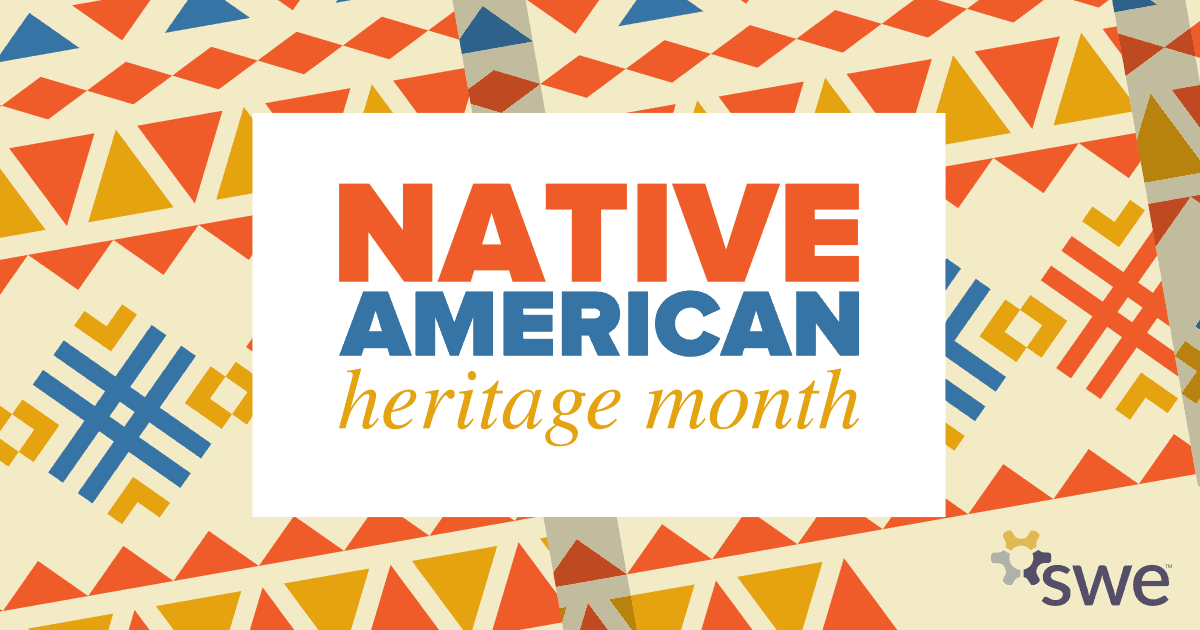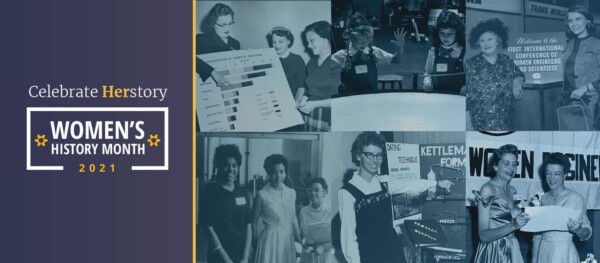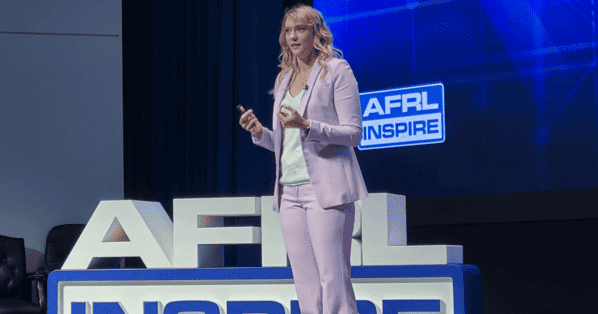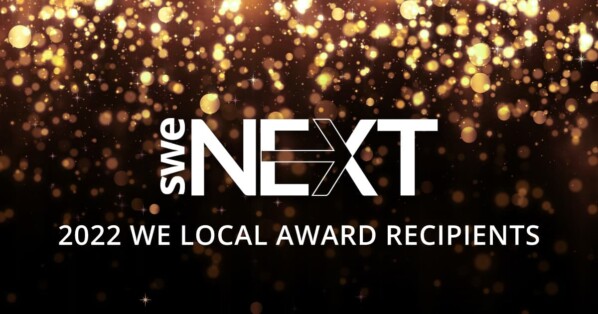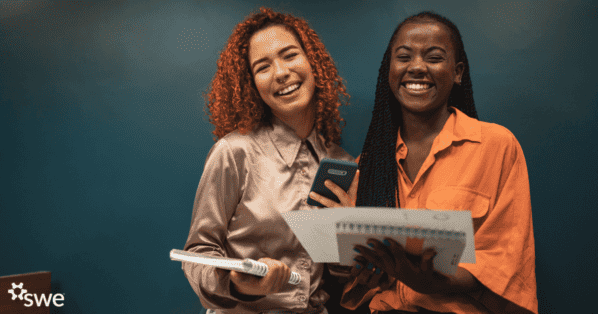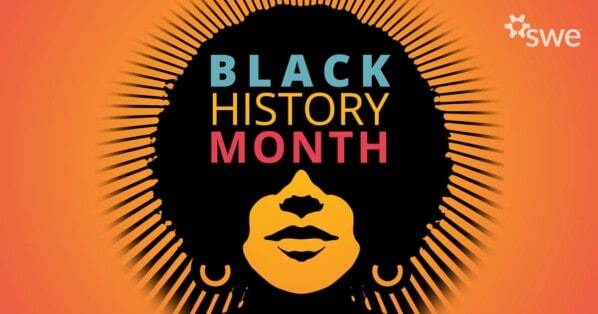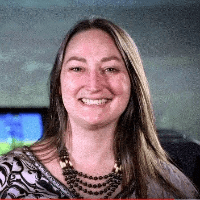
November is Native American Heritage Month (NAHM). This month was established to honor and recognize Native Americans as the first people of this nation and to celebrate both their cultural heritage and integral importance to our past, our present, and our future.
To help celebrate NAHM, we reached out to Laura Smith-Velazquez (Cherokee Nation): SWE Member, SWE Native-American Affinity Group lead, and winner of the 2020 American Indian Science and Engineering Society (AISES) Technical Excellence Award. Check out our interview with Laura to learn more about her STEM background and her connection to the Native American community.
Happy Native American Heritage Month!
What initially inspired your interest in engineering and/or tech?
I grew up watching Star Trek with my Grandmother and reading science fiction novels such as Anne McCaffrey Dragonriders of Pern where they colonize another planet. In addition we have a Cherokee story about how the the Milky Way came to be. I loved staring up into the deep dark skies of Michigan where I could see the Milky Way with my own eyes since there wasn’t that much light pollution. It was laid out like a river of stars. It was so beautiful and I was curious about what was out there and maybe who was out there and wanted to Captain my own starship to explore the galaxy. This filled me with wonder and started my heart as an explorer. When I was 8 years old my parents got me a telescope for Christmas and this sealed it; I wanted to be an astronaut.
Where did you go to school, and what did you major in? Why?
It is important here to understand that I am the first person to graduate high school in my family, though I’m not the first to go to college. When I was little, my dad—at about 36 years old with six children—decided to go to college and get a bachelor’s degree in Anthropology to better our lives and get a better job. He studied hard to get his GED and enrolled at Grand Valley State University. My older siblings took jobs and my mom took a second job and we made it happen. Dad stayed home, took care of us kids, and completed his degree. This showed me how awesome a college campus was and I knew I wanted to go to college, too.
We only had one car so my grandmother drove dad back and forth to classes or when my mom was off she would attend with my dad. I would play in the Anthropology Lab dressing up a skeleton named Twiggy and I would sit and pour over books in the campus bookstore. Without this influence I am sure that I, too, would have never graduated high school or got a college degree. For many Native families we are often busy just surviving… putting food on the table, trying to get electricity, plumbing, etc. Many—especially on reservations—make do without these basic necessities.
In the 1830s, during the removal, my dad’s family hid in the Missouri caves to avoid the militia. We lost everything back then. My mom’s family were trappers in the Blue Ridge Mountains and it was difficult to be Native in the South. It was like they had to go into hiding. So my grandparents started life from scratch. It is amazing how far they had come despite everything!
There really isn’t a direct path to becoming an astronaut. It’s not like something you go to school for so I looked up all the astronauts in the past and saw what they took to become astronauts. They were pilots and they were engineers. I like solving problems, I like helping people, and I really was fascinated about flying.
I thought of going into the Air Force or the Navy and becoming an aviator, but at that time, women weren’t allowed in combat and there were only four women in the Air Force that were pilots. They were all trainers of pilots. Two of them went on to become astronauts. One was commander of the space shuttle and the other was a commander of the International Space Station, however these odds are not good. So I chose to go the civilian route. I wasn’t really sure where to go to school, but one day on the school career bulletin board there was an info card on Embry-Riddle Aeronautical University. When I learned that the entire University was devoted to Aviation and Aerospace I decided that this is where I wanted to go to school and I didn’t apply anywhere else; luckily I got in.
I originally dual majored in aerospace engineering and aeronautical science, however I couldn’t afford to pay for both as I was working full-time and paying for my own college education. As it was, that first year I had trouble even paying for food and housing. I had come to Embry-Riddle going from Michigan to Florida, finagling my own way down with a ride from a stranger (another student’s parent) with $20 in my pocket and a duffel bag of necessities bought from the dollar store. So I chose the pilot route because I wanted to Dance the Skies and I wasn’t sure what type of engineering I wanted to do.
I found my passion as an intern for American Airlines. I had my commercial pilot certification and a minor in Meteorology and Flight Safety Accident Investigation. I was going to do their pay for hire program where you work for the airline and you pay $10,000 for your flight training. When a spot opens up and you have enough hours to move in, you get a pilot slot. It wasn’t like today where there is a shortage of Pilots. Back then Pilots were a dime a dozen and it was really difficult to get a flight position. However I was doing line training during my internship and flew in just about every make and model flight deck that American Airlines had. I was teaching line Pilots how to use their new stormscope and here I realized that I was way too hyper to fly an autopilot for 8 hours a day. However the system design had many human factors and safety issues that I realized I could design a better Flight Deck.
At that time, Embry-Riddle Aeronautical University had started a new master’s degree program called human factors and systems. I had discovered my passion for operator interface design, helping to make systems more effective, efficient, and safe in the aviation and Aerospace industry. I enrolled in human factors & systems major and did a dual concentration in human factors engineering and systems engineering with focuses on long duration space flight and habitation module design and a backup focus in flight deck and automation design. This MS in combinations with my aeronautical science degree (which is really aircraft systems and navigation sciences) really made me an excellent systems engineer.
What was/is your experience as a minority in engineering? Who did/do you turn to for support and/or mentoring?
What a loaded question! Sorry if this is a bit of a stream of consciousness. I find that my Cherokee culture is very different from American culture. We are very “we” oriented with a collective identity. This results in being a great team player, personable, proactive, and focused on the larger picture. In addition my culture doesn’t have a hierarchy system like traditional American culture and often we have what is called a leadership of equals. Corporate America is cut-throat and the individual is often praised above the team with the team lead getting most of the acknowledgement. Managers are often insecure and craft an image and message for their higher ups. Within corporate America middle managers are also forced to focus on near term even if it is a long-term detriment to success.
My open, transparent style of communication and Cherokee culture (which is also matriarchal as opposed to American Patriarchal culture) is in conflict with this (however in research where failure is not the doom product design and development is and is often understood as well a much flatter, more open organization, with more transparent communication, I have had less of these problems). People are always amazed when I can converse easily with our CEO and managers get nervous when their employees have a direct line of communication above them. I wish this wasn’t the case, but in the multitude of companies I have worked for, this has been my experience regardless of what the corporate values state. With my personality and cultural background I don’t fit the traditional employee mold. I don’t do well in a hierarchy autocratic form of management.
I am what is called “white passing” as I don’t look like the stereotypical Plaines Indian you see in western movies. This leads people to assume I am the same culture and I should automatically think the way they do and am evaluated on norms that I don’t fit without any explanation. Even if they recognize I am different I am most commonly guessed at as Turkish or Israeli based on my features. So many managers have said “you can only change yourself”, but what they really mean is change yourself so you can fit their mold. I used to try and spend so much time and energy trying to be something I am not that it really affected my work and personal health. I do not do this any longer. I am my original self and work to have this conversation early on with my coworkers and managers so they don’t assume and they understand my diversity and the value I bring. This allows us to level set each other and accommodate with positive outcomes.
Being a woman and my team-oriented culture has led many to try to push me into management and out of the technical realm. For me the technical side is what I love to do, but there are very few women here. I have resisted this push my entire career. I do not want to be a Program Manager. Unfortunately as a woman in tech, it is harder to get promoted. In my last job I often was the highest performer and doing the same job as the men who had already been promoted (this year alone won 4 awards) yet I have not been promoted in 9 years despite having many conversations of why. I experienced the unreachable goals followed by vague goals to finally getting a consolation raise to acknowledge my hard work and success yet still no promotion. In the past I have had to leave the company to get promoted.
As for being the only Native and women in the room… I have experienced imposter syndrome and a bit of bullying (due to my lack of cultural fit). It is hard to prove these and the best way I have dealt with them is to get mentors who could help me with navigating these issues and or to find a new role. Unfortunately, HR has not been helpful. I’ve had to seek my own role models as there are very few Natives and Women in STEM. In addition, in human factors engineering, often you’re the only engineer in the company so there are very few technical mentors. I’ve had to look outside of my company often for mentors which is why SWE and AISES are so important! Most companies don’t even have a resource group for Native Americans.
Even as a team lead and successful employee, I have had to demand raises and work a lot harder to achieve what others have gotten. Yet I am always randomly selected to be on the diversity panel and counted. Sometimes this has frustrated me, but in the end I have learned to advocate for myself, to find a corporate champion who is dedicated to advocate for me (this is very important!) and even if I am not promoted I usually have negotiated a better wage and proven myself in industry. In the end if it doesn’t work out, seek a better fit for yourself!
Related content:
- SWE Celebrates Native American AG Lead for AISES Award
- Ways YOU Can Help in the Latinx/Hispanic Community!
- SWE Signs on to Support “Million Girls Moonshot” STEM Initiative
- Against the Odds: Engineer Elayne Arrington
- Women in Tech on the Fast Track
Author
-

SWE Blog provides up-to-date information and news about the Society and how our members are making a difference every day. You’ll find stories about SWE members, engineering, technology, and other STEM-related topics.

